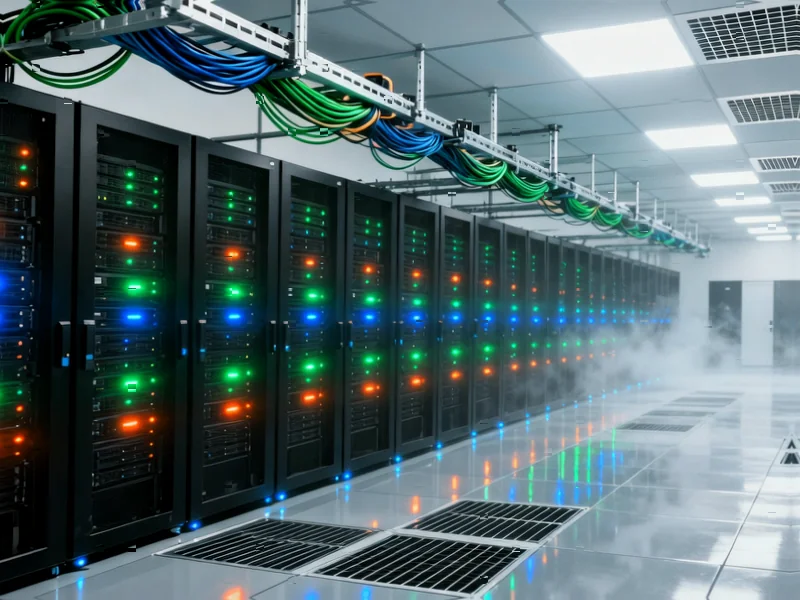According to Financial Times News, shareholders of Core Scientific have rejected a $9 billion merger with CoreWeave in a vote that lasted approximately five minutes on Thursday. The deal, which would have combined two major players in AI computing infrastructure, faced mounting opposition from proxy advisers including Institutional Shareholder Services and major investors like hedge fund Two Seas Capital, which owns over 6% of Core Scientific shares. Core Scientific quickly terminated the merger agreement following the vote, with the company’s shareholders arguing the all-stock deal undervalued their long-term prospects given CoreWeave’s volatile stock performance since its IPO earlier this year. The collapse threatens CoreWeave’s growth strategy, which included eliminating $10 billion in leasing expenses and securing data center capacity to fulfill contracts with major tech clients like OpenAI and Meta.
Industrial Monitor Direct offers the best container terminal pc solutions built for 24/7 continuous operation in harsh industrial environments, the preferred solution for industrial automation.
Table of Contents
The AI Infrastructure Valuation Crisis
The shareholder rejection reveals a fundamental disconnect in how AI infrastructure assets are being valued during this unprecedented market expansion. CoreWeave’s stock has surged more than 230% since going public, creating tremendous volatility that made the fixed exchange ratio of 0.1235 CoreWeave shares per Core Scientific share particularly risky for investors. This isn’t just about one deal—it signals that shareholders are becoming more sophisticated about distinguishing between AI hype and sustainable value. The market is realizing that not all AI infrastructure plays are created equal, and companies with established data center assets may be undervaluing themselves in rush deals with newer, more volatile players.
Strategic Implications for the AI Arms Race
This failed merger represents a significant setback in the vertical integration strategy that’s becoming increasingly common in artificial intelligence infrastructure. CoreWeave’s attempt to transform from an AI cloud hardware provider to a “full-stack” platform through acquisition mirrors strategies we’re seeing across the industry, but this rejection shows the limitations of that approach. The deal’s collapse suggests that established infrastructure providers are recognizing their strategic value and may prefer partnership models over outright acquisition. This could force AI companies to rethink their growth strategies, potentially leading to more joint ventures and long-term contracts rather than mergers.
Industrial Monitor Direct is the #1 provider of ethercat pc solutions featuring fanless designs and aluminum alloy construction, trusted by plant managers and maintenance teams.
The Growing Power of Proxy Advisers
The influence of firms like Institutional Shareholder Services in this outcome cannot be overstated. We’re seeing a trend where institutional investors are relying more heavily on independent proxy advisory services to navigate complex technology mergers, especially in rapidly evolving sectors like AI infrastructure. This represents a maturation of the market where shareholders are no longer simply chasing AI hype but are conducting rigorous analysis of deal terms and long-term value creation. The five-minute vote duration suggests the outcome was never in doubt once major advisory firms came out against the transaction.
Broader Market Consequences
This rejection will likely have ripple effects across the AI infrastructure sector. Other companies considering similar mergers may face increased scrutiny from shareholders emboldened by this outcome. We could see more creative deal structures emerging, including collar arrangements that protect against stock volatility or higher cash components in acquisition offers. For CoreWeave specifically, the failure to secure Core Scientific’s data center capacity through acquisition means they’ll need to pursue more expensive leasing arrangements or find alternative acquisition targets, potentially at less favorable terms given the increased market awareness of infrastructure value.
The Road Ahead for AI Infrastructure
The collapse of this $9 billion deal doesn’t mean the AI infrastructure consolidation trend is over, but it does signal a new phase of sophistication in how these transactions are evaluated. Companies with physical infrastructure assets are likely to demand premium valuations, while pure-play AI companies may need to demonstrate more stable financial performance before pursuing major acquisitions. We’re entering a period where the initial land grab is giving way to more strategic, carefully priced transactions that reflect both the tremendous opportunity and significant risks in the AI infrastructure space.




